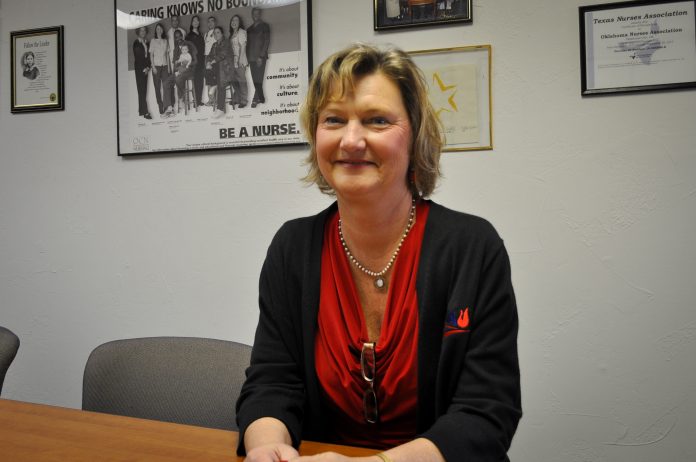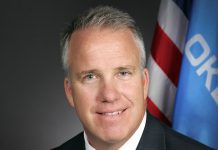by Mike Lee Staff Writer
Pam Spanbauer, RN, BSN, MEd, may be retired from her nursing practice but her impact on healthcare in Oklahoma will be felt for generations to come.
As the governor’s appointee to the Physician Manpower & Training Commission, Spanbauer is the only nurse on the board that helps ensure healthcare for thousands of rural Oklahomans.
Now the board chair, Spanbauer helps make sure that small communities in Oklahoma get the competent and professional physicians they so desperately need.
Spanbauer also currently serves as the vice president of the Oklahoma Nurses Association.
The commission is a task-force established in the 1970s.
“They have funding to help fund physicians in training to go out into the rural areas in Oklahoma,” Spanbauer said. “In Oklahoma we have so much rural area. In these farming communities the last thing they can do is take a day and drive to the city to get healthcare and drive back.
“It’s really important especially with the fact we don’t have many hospitals in the rural area.”
Spanbauer was raised in a small town in North Carolina. She had a single doctor growing up who took care of her entire family.
“If we had to have gone to the city we probably wouldn’t have gotten healthcare,” said Spanbauer, whose family lived 50 miles from the nearest hospital. “I’ve always had that small-town respect.”
She says the reality is that most doctors are going into specialty practices. Those who head to family medicine will stick closer to more populated areas.
The commission will cover a significant portion of a doctor’s tuition for a commitment to be the physician in a rural area.
“Many of the physicians actually wind up staying in that area after their commitment is done,” Spanbauer said. “If it weren’t for that a lot of doctors wouldn’t even know there are these opportunities and how great healthcare can be in a small community.”
Spanbauer and the commission review each applicant and decide the best place to match each doctor. Communities routinely send in requests for physicians to cover their population.
The mission of the Physician Manpower Training Commission is to enhance medical care in rural and underserved areas of the state by administering residency, internship and scholarship incentive programs that encourage medical and nursing personnel to practice in rural and underserved areas. Further, PMTC is to upgrade the availability of health care services by increasing the number of practicing physicians, nurses and physician assistants in rural and underserved areas of Oklahoma.
Subsequently the Oklahoma Legislature has added the responsibility of a Physician Placement Program, Nursing Student Assistance Program, the FP Resident Rural Program, the Physician Community Match Program and the Physician Assistant Scholarship Program. Spanbauer says the commission is guided in all the programs by a sense of stewardship which requires that maximum effort, both individual and organizational, be utilized to increase the number of practicing physicians, nurses and physician assistants in Oklahoma and, particularly, in rural and underserved areas of the state.
“I’ve always had a strong desire to give back in some way which is why I love being retired,” Spanbauer said. “I loved what I did when I was working but now it’s like I can give back. When I was working I didn’t have as much time.”
During her career, Spanbauer served as an EMT and drove an ambulance for Children’s Hospital. She also helped start the MediFlight program and later spent nearly her entire nursing career at Mercy.
“I had an opportunity at that time to see how spread out everything in Oklahoma is,” she said. “We would drive to pick up a baby and see how some of those hospitals barely had enough to get by. They didn’t have all the equipment we had in the city to take care of these premature babies.
“I’ve always been very passionate about wanting everybody to be able to have access to care. It’s a fact that people don’t.”
Spanbauer says the commission is charged with five high-priority goals:
1. Work to improve the balance of physician manpower distribution in the State of Oklahoma, both by type of practice and by geographic location;
2. Aid accredited physician training facilities in the establishment of additional primary medical care and family practice internship and residency training programs by sharing in the cost of these programs;
3. Assist Oklahoma communities in selecting and financing qualified medical and osteopathic interns/residents to participate in the Physician Community Match Program;
4. Assist Oklahoma communities, in any manner possible, in contacting medical and osteopathic students, interns and residents, or other physicians (inside and outside Oklahoma) who might wish to practice in Oklahoma;
5. Work with Oklahoma communities and the leadership of Oklahoma’s nurse training institutions to provide nurses for underserved areas of the state.
“It gets back to what medicine is all about and that’s the relationship the doctor has with the patient and the community,” Spanbauer said.
And that’s how Spanbauer makes a difference for future generations to come.














